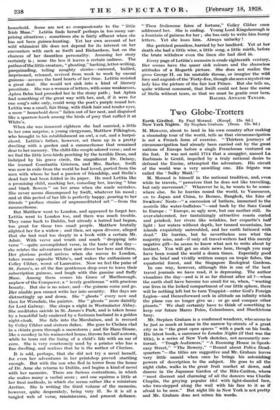Two Globe-Trotters
M. MORAND, about to land in his own country after making a steamship tour of the world, tells us that circumnavigation is not a French form of exercise. " Thirteen journeys of circumnavigation had already been carried out by the great nations of Europe before a single Frenchman ventured on the feat. It was not until 1714 that a smuggler, named La Barbinais le Lentil, impelled by a truly national desire to defraud the Excise, attempted the adventure. His circuit of the world was a very unwilling one. His frigate was called the ' Sulky Maid.' " M. Morand is himself in the national tradition, and, even while he travels, " perceives that he does not like travelling, but only movement." Wherever he is, he wants to be some- where else. So he hurries round the world, to Vancouver, on to Japan and China, to Borneo, Bangkok, the Isles of Swallows' Nests—" a succession of bathers, immersed to the nostrils like water-buffaloes "—and back by the Suez Canal to Europe : " Europe, so ugly now, but our mother still. So over-elaborated, her tantalizingly attractive coasts curled and prinked, her rivers like wrinkles, her coquette's half light : her waters without depth, her tanned mountains, her islands exquisitely untroubled, and her earth fattened with dead." He hurries, but he nevertheless sees what the majority miss, and—if only all travel-writers had this merely negative gift—he seems to know what not to write about by instinct. You will get no stale news here, though you may have been round the world a dozen times. Especially good are the brief and vividly written essays on tropic fishes, the equatorial forest, and the Singapore Zoological Gardens.
In one way, however, although this is one of the best travel journals we have read, it is depressing. The author visualizes the day—and is it so far distant after all ?—when the earth shall have become too small for us, when, " wasting our lives in the locked compartment of our little sphere, there will be nothing left but to turn Trappist—enter God's Foreign Legion—and thenceforward seek in altitude an infinity which the plane can no longer give us : or go and conquer other planets." We shall certainly have to think of something to keep our future Marco Folios, Columbuses, and Shackletons busy.
Mr. Stephen Graham is a confirmed wanderer, who seems to be just as much at home in the narrow by-streets of a great city as in " the great open spaces " with a pack on his back. His latest book, a successor to London Nights (if that was the title), is a series of New York sketches, not necessarily noc- turnal. " Tough Audiences," "A Rooming House in Speak- easy Street," " The Bowery," " Round about Police Head- quarters "—the titles are suggestive and Mr. Graham leaves very little unsaid when once he brings his astonishing powers of description to the subject. He goes to all the night clubs, walks in the great fruit market at dawn, and dances in the Japanese Garden of the Ritz-Carlton, where " most discreet and charming of all the dancers was Charlie
Chaplin, the greying popular idol with light-dazzled face, who two-stepped along the wall with his face to it as if afraid to be seen." But night life in New York is not pretty and Mr. Graham does not mince his words.






































 Previous page
Previous page